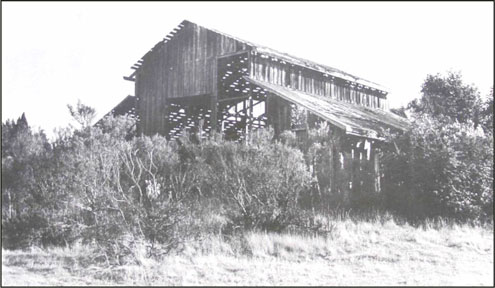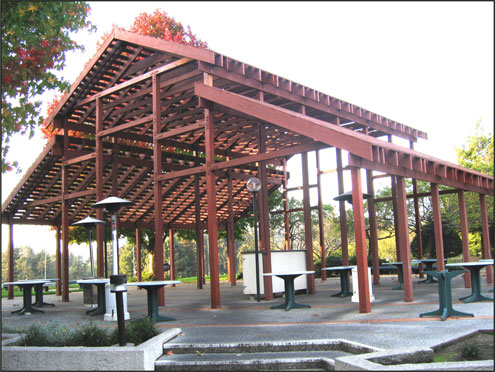By Kevin Newhouse
 The apple packing plant built by F.A. Hihn in the early 1890s is closer than ever to being moved to its new location just behind the Bay View Hotel. The inside of the barn has been gutted of all non-historic elements and the entire building is sitting on a temporary foundation of pallets. I would be lying if I told you I wasn’t worried about the structure surviving the move.
The apple packing plant built by F.A. Hihn in the early 1890s is closer than ever to being moved to its new location just behind the Bay View Hotel. The inside of the barn has been gutted of all non-historic elements and the entire building is sitting on a temporary foundation of pallets. I would be lying if I told you I wasn’t worried about the structure surviving the move.
Although I have no other choice but to trust the developer who tells me it can be done, I can’t help but be reminded of another barn with historical significance that was supposed to be saved and restored. A barn that was included in a development proposal in Aptos during the 1970s. A development that was managed by the same bloodline as today’s Aptos Village plan. This is the story of Amelia’s barn.
Behind Deluxe Foods, in the upper part of the Deer Park shopping center, there is a restaurant called Red Apple Café. On a nice day, you have the option of sitting outside where they have tables set up inside the skeleton frame of a barn. Most people I’m sure assume this barn is just a clever and cute idea since the restaurant overlooks the last of what was once a great farm. Well it is clever and cute but I’m here to tell you the real story of why it was built.
 The land was originally owned by Rafael Castro, who in 1833 was deeded the 6,680-acre Rancho Aptos land grant. Castro made it a tradition to gift the land to his children as they married or matured … whichever came first. In 1855, Castro’s daughter Maria, wife of Nicholas Valencia, was given 160-acres and that same year his son Antonio was given 60-acres. Over several years, a portion of these two parcels were combined and sold from one person to the next until 1871 when Benjamin Nichols ended up with a total of 120-acres.
The land was originally owned by Rafael Castro, who in 1833 was deeded the 6,680-acre Rancho Aptos land grant. Castro made it a tradition to gift the land to his children as they married or matured … whichever came first. In 1855, Castro’s daughter Maria, wife of Nicholas Valencia, was given 160-acres and that same year his son Antonio was given 60-acres. Over several years, a portion of these two parcels were combined and sold from one person to the next until 1871 when Benjamin Nichols ended up with a total of 120-acres.
Nichols and his wife Margaret built their house facing the Coast Road (Soquel Drive) exactly where the Loma Linda apartment complex stands today. Further down the road, on the eastern side of their farmland, they built a barn, which was mostly used for storing hay.
Nichols was a well-respected man in the Aptos community. He and his wife raised 4 sons and 2 daughters. He started out in the lumber industry but eventually moved on to farming. Later in life he became a judge. His health started to fail in 1894/95 so he and his wife moved to a small house on Union Street in Santa Cruz.
It was around this time that for unknown reasons, they borrowed $7,000 for 1-year from a San Jose man named William Dawson. They mortgaged their farm in the deal. After not repaying the loan, Mr. Dawson foreclosed and purchased the 120-acre Aptos farm at a Sheriff’s sale in 1897.
Dawson, a Scotsman with a thick accent, was jolly, wealthy, and a prominent man around town. Unfortunately, after about 3-years, he became sick with cancer and was confined to his house. Two single girls in town, Clara Walsh and Amelia Arano, volunteered to help take care of Dawson while he was ill. Walsh was working at her Uncle Patrick’s Live Oak House (where today’s Bay Federal Credit Union now stands) and Arano was working at the Bay View Hotel, which was built by her parents in 1878. Arano is also a granddaughter of Rafael Castro from earlier in the story.
In early 1902, Dawson had to be institutionalized in San Jose and he died there in 1904. In his will, he left his Aptos property to Walsh and Arano as a thank you for their kindness and selfless offering to help while he was ill. The property was split 50/50 with Arano taking the eastern portion including today’s Deer Park Shopping Center and the barn on the hill.
In 1915, Amelia decided to convert the west bay of the barn into an apartment and moved in. She would live in that barn for the next 35 years and it is rumored, but not confirmed, that she is responsible for planting the apple orchard down below, which still exists today. Between 1928 and 1945, she sold portions of her farm but always kept the barn as a “life estate.”
Amelia finally moved out of the barn in 1950 and into her brother’s house on Cathedral Drive to help take care of him after he had been critically injured in a car accident on the newly constructed Highway 1. He died a year later. Amelia stayed in his home and she too died there in 1954 at the age of 91.
The proposal for a commercial development within Rio Del Mar had been controversial for many years. Early proposals had been presented and rejected but in April 1973, a more palatable, but still controversial, proposal was accepted and the construction of Deer Park Shopping Center began. One of the conditions was that the old barn and the surrounding 1-acre of land at the high point of the development were to be maintained as a public monument in perpetuity as a memorial to Amelia Arano.
However, in October 1977, the developer Carl N. Swenson Co, who just so happens to be Barry Swenson’s Grandfather and predecessor to the Barry Swenson Builder Company, suggested that even though the original proposal included the preservation of the barn, they had come to find out that the barn was “not structurally sound.” In November 1977, they received permission from the county to level the barn and reconstruct a replica in its place.
I am fully aware of and in agreement with “safety first” when it comes to maintaining our town’s infrastructure and buildings, but I would hate to see another historic building suffer the same fate as Amelia’s Barn did almost 40 years ago.
•••
For more information about the Aptos History Museum, upcoming events, or becoming a member of the museum, please visit www.aptoshistory.org and follow us on Facebook and Instagram @aptos_history_museum.

